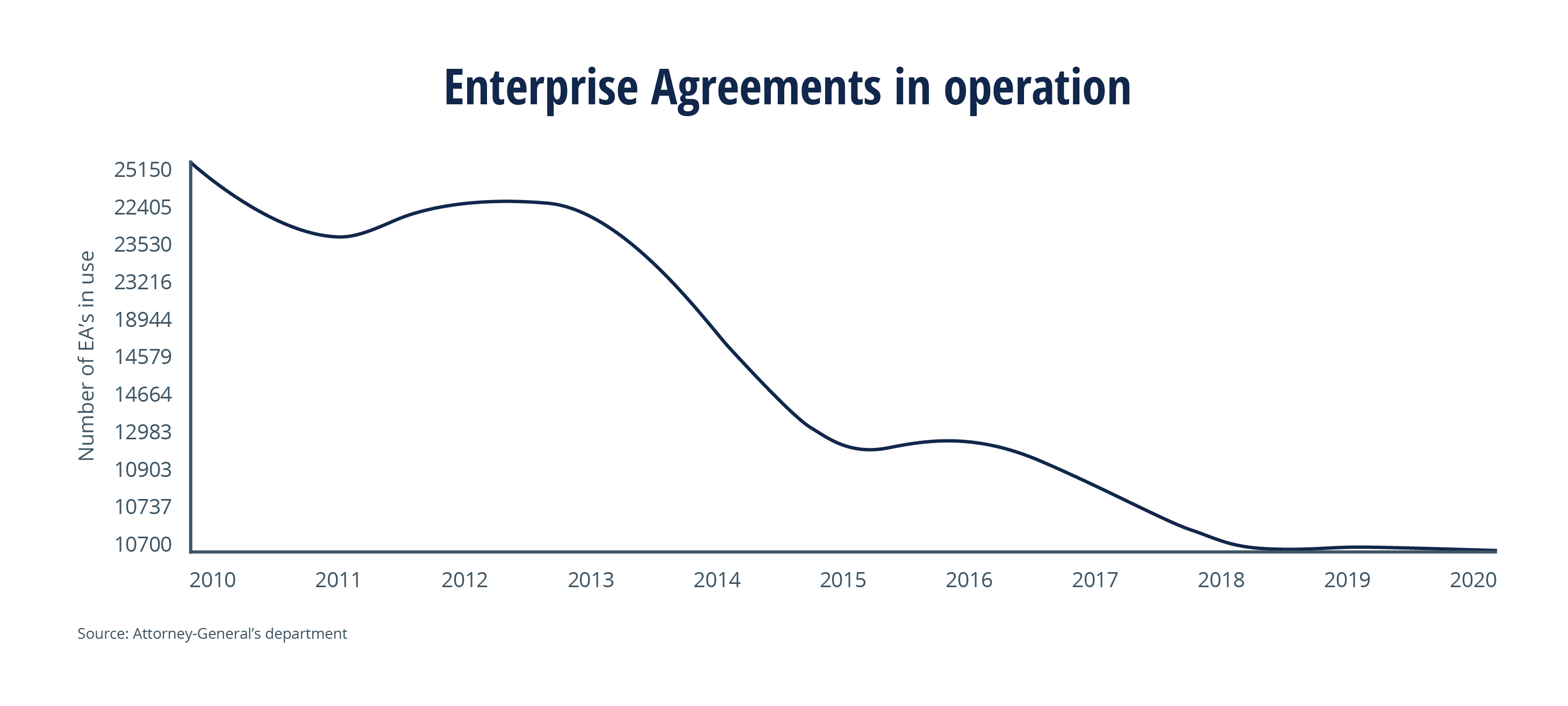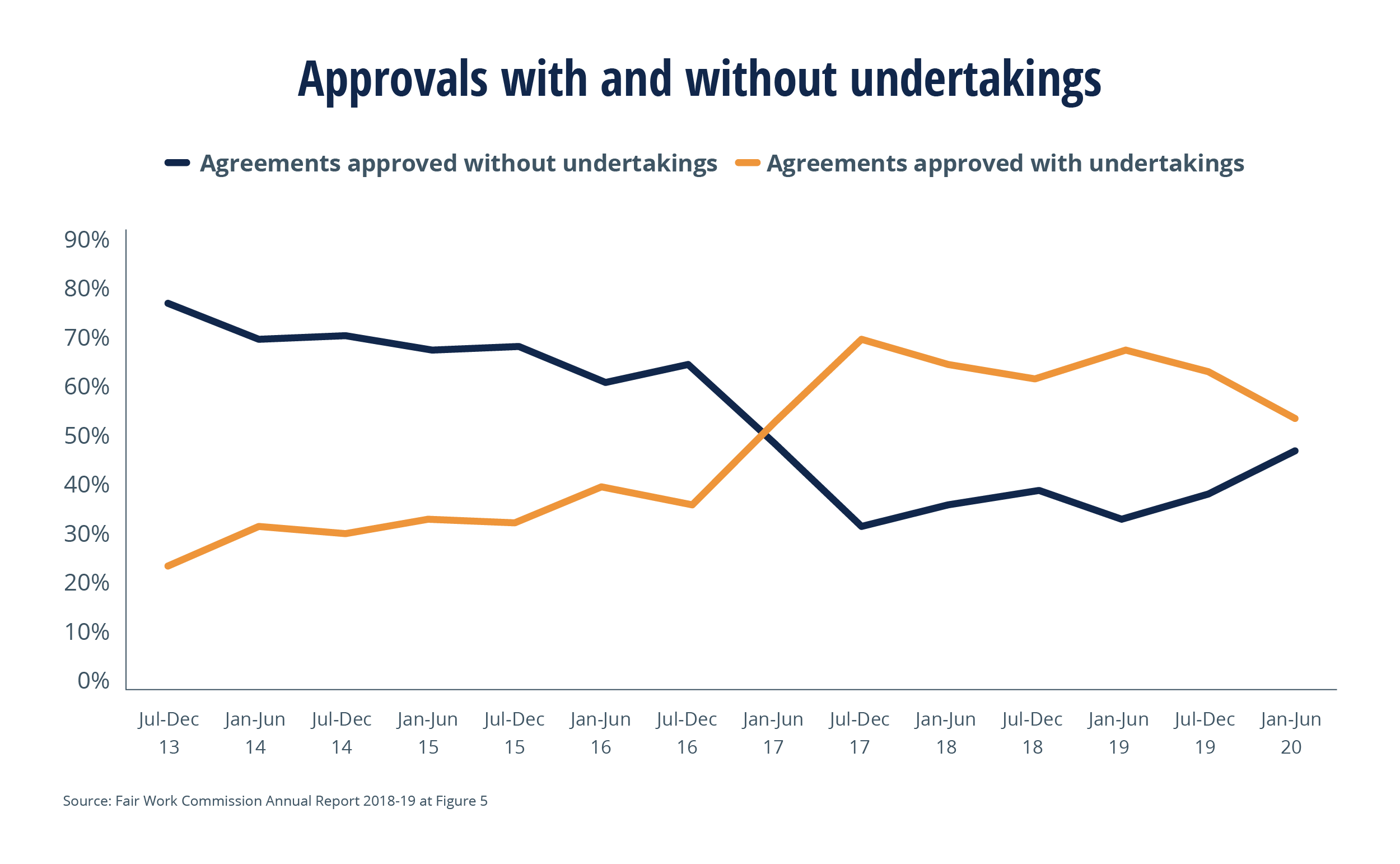The number of enterprise agreements (EA) being delayed or knocked back by the Fair Work Commission (FWC) has increased since the FWC tightened measures around EA approvals.
Australia has seen a significant decline in enterprise agreements in the past decade, from more than 25,000 in 2010 to 10,700 in June 2020.
This sharp drop is partly due to the complexities associated with getting an EA approved.
Here, CCIWA looks at the data.

Volume of undertakings
The FWC may approve an EA that does not meet certain requirements of the Fair Work Act (FW Act) if they FWC is satisfied that a written undertaking provided by the employer can address their concerns. These undertakings then form part of the approved EA.
The number of EAs that needed undertakings, where the FWC is not satisfied an agreement meets its statutory requirements, have increased during the last seven years.
During the second half of 2013, 22 per cent of EAs required undertakings whereas in the first half of 2020, 54 per cent needed undertakings.

Triage process
FWC Deputy President Beaumont says the FWC’s triage process for EAs, introduced in late 2016, accounted for this increase.
“The triage process is designed to increase rigor in assessing all agreements and approval applications in order to increase consistency in the decision-making process for these applications,” she explains.
The triage process involves assessment of an application according to a checklist of statutory requirements and may include modelling and analysis from the FWC.

Director of CCIWA’s Workplace Relations legal team Ryan Martin adds that the FWC has also adopted a much more strict interpretation of the better off overall test or BOOT, which requires all workers to benefit from new workplace deals.
“This includes assessing ‘hypothetical scenarios’ when assessing the BOOT, which has also led to the increased amount of rejected applications and undertakings required,” he says.
Deputy President Abbey Beaumont says applications requiring undertakings tend to be more complex and take longer, particularly when written permission from employers or bargaining representatives is required.
“The Commission is working with parties to improve the processing times for applications to approve,” she adds.
Reform to simplify process
During the last nine years there has been a significant decline in the number of EAs in place nationally, from 25,000 in 2011 to 10,700 in June 2020.
Acknowledging that the EA approvals process is fraught with technicalities, the Federal Government has proposed amendments to the legislation governing the process.
CCIWA Principal Workplace Relations Advocate Paul Moss, who was involved in the recent Federal Government’s IR roundtables, explains that proposed changes to the BOOT will provide added flexibility for EAs.
He says the changes, to be debated in Parliament in March, should incentivise more businesses to consider EAs.
“We are looking at modest incremental change to enterprise bargaining system - we’re not looking at wholesale reform and … as a result of these, enterprise bargaining may well become more attractive,” he says.
“If you’ve looked at enterprise agreements and said ‘this is too hard – there’s no benefit’, these changes may encourage you to look at it again, but we’re not going to be looking at such significant change that a massive increase in the number of businesses which will be flocking to enterprise agreements.”
Why advice is key
Martin explains that one of the major deterrents to going down the EA path is the process is fraught with complexities, which compounds the need to get professional advice.
“Unfortunately, it has become an incredibly technical and strict interpretation of the legislation by the FWC and the courts” he says.
“There are far too many pitfalls that catch people out and businesses can waste a lot of time and effort if they don’t have the technical expertise to guide them through that process and make sure they are not going to get tripped up after a lengthy period of bargaining because they have missed some critical technical steps or key dates. This is also why the proposed reform is so important.”

It is also important for businesses to understand the cost associated with creating an EA, particularly through compliance factors, Martin adds.
“I would always recommend a business undertakes a process of financial modelling before initiating bargaining, and this should inform their bargaining strategies. Otherwise, you may agree to terms and conditions with the bargaining representatives, but then find out that in order to satisfy the BOOT you may end up with costs you have not anticipated and the business cannot actually afford, particularly where there are multiple underpinning awards.” he explains.
People need to have a full understanding of these technicalities and costs and consider whether an enterprise agreement will work for their business or whether there might be better options available to them.
For advice or assistance with the EA approvals process, contact CCIWA’s Employee Relations Advice Centre on 9365 7660 or CCIWA’s Business Law division here.












